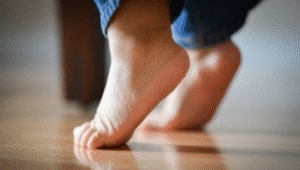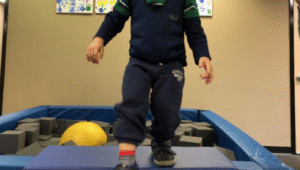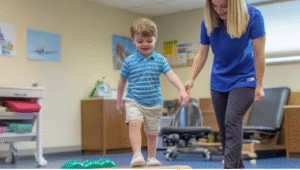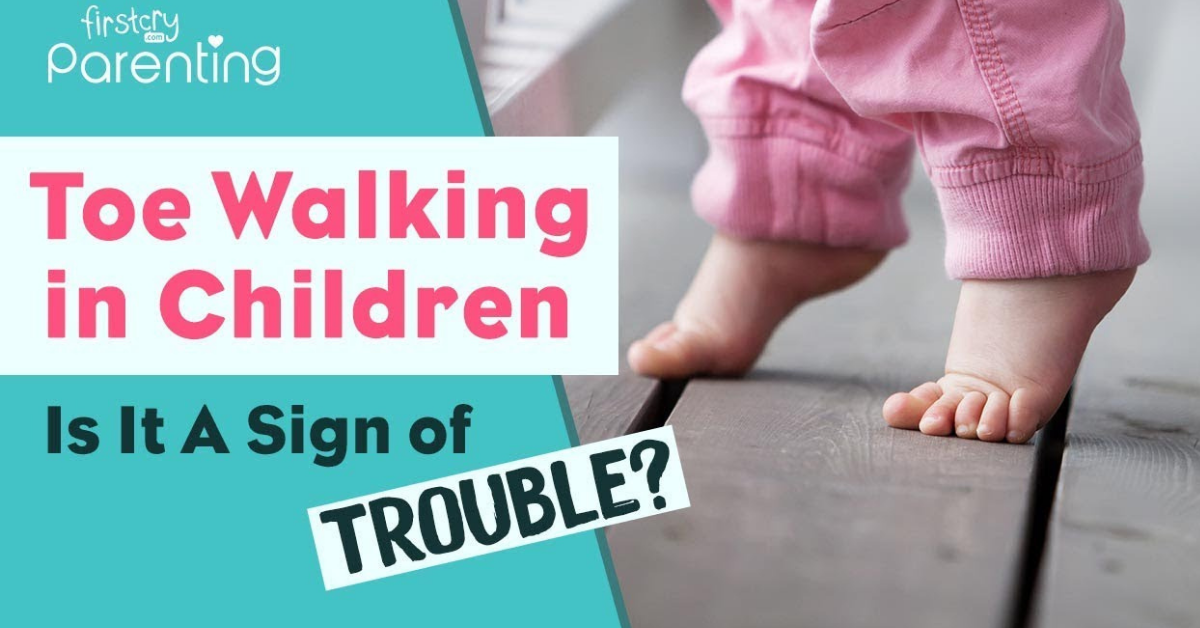What Causes Children to Walk on Their Toes?
Have you ever witnessed a child walk on the tips of her toes? It may be adorable, but it can also be disturbing. This is one question I am regularly asked by many parents when they notice the children walking on their toes. It is not even a minor habit. It may be an indication of something more, such as a health condition, a muscular condition, or even a sensory need.
This article is going to examine some of the realistic causes of toe walking. We are going to use words that are easy to understand and even a little child might understand. Parents can be loving as well and this is what we will discuss. This guide will provide the answers in an accessible way that you might be looking to find them in case you are worried or just confused about it.

The way Family Therapy Step Mom Talks Open the Real Issues
In some cases, Walk on their toes is noticed by the step moms or stepparents. During family therapy step mom sessions, emotional discussions usually entail physical challenges as well. It is also possible that kids can walk on toes due to anxiety, overstimulation or indecision.
This is one of the behavior changes that can be witnessed in blended families. Therapy assists all people to share. The benefits are that a stepmother has new eyes and a loving touch that can give comfort. With the help of this, families will be in a position to know whether toe walking is merely a habit or a cry of distress.
What makes children walk on their toes?
walk on their toes is caused by different factors. These are the most popular ones and simply explained:
- Tight muscles (Masterses; especially the heel or the calf)
Other children possess deformed leg or feet muscles. This obstructs walking with a flat foot. To them, it is easier to tiptoe. In case it is just the physical issue, then a physical therapist is able to stretch those muscles.
- Chronic Habitual Toe Church
This is just that of walking on toes as a habit and not as a condition of pain or disease. Other children begin to do it as soon as they can walk on their feet. It is acceptable when they quit at the age of 3 or 4. However, when it persists, consult a doctor.
- Autism Spectrum Disorder (ASD)
Other children with autism can be seen to walk on their toes. They may enjoy the experience or routine walking may be incompatible. This does not imply that all toe-walkers are autistic-in-miniature but it is an indication.
- Processing Problems in Senses
Sensory-based kids can feel that flat walking is strange or that there is too much of it. Walking on toes provides them with a different feeling. These children may as well wear a covering of the ears or hate some types of clothing.
- Cerebral Palsy or Neurological conditions
Toe walking in exceptional cases is connected to nerve or brain disorders. These could even influence the movement of the muscles. The early test and treatment may avert issues in the future.
- Short Achilles Tendon
This is the cord that links your heel to the calf; it is known as the Achilles tendon. Should it be too short, then it may lift the heel. This makes walking flat difficult or painful. Physicians can recommend stretching, treatment, or soft braces.

At what Age Should Parents Worry?
Toddlers are supposed to toe walk at times. but in case your child:
- Toes only walking
- Does it go beyond age 3 or 4
- Has rigid legs or loss of balance
Then, it is the moment to consult your doctor. It can exclude larger issues during a check-up and provide assistance on time.
Diagnosis of Toe Walking Problems by Doctors
walk on their toes Physicians may or may:
- One of the basic walking tests
- Testing of the muscles Strength tests
- Nerve tests and reflex tests
Having an interest in your family background
In case they require they might refer you to a specialist to undergo further tests such as:
- MRI
- Blood tests
- Autism screening
Though, in the majority of cases, it is not severe. What matters is early intervention.
Best Treatments for Children Who Walk on Their Toes
Walk on their toes the management varies with the cause. The following are some of the sensitive means through which one can assist:
Physical Therapy
Our aim should be to loosen tight muscles so we should perform stretching exercises, walking drills and practicing balance. A large number of children get well with home exercises and weekly therapy.
Special shoes or Braces
There are treatment options that involve wearing braces or shoe inserts, which promote flat walking in some kids. These are not painful, but comfortable. It is like reminding the foot how to walk.
Occupational Therapy
Occupational therapists can be used when your child has sensory problems or autism. They instill into children the way to have fun whilst walking and feel safe in their bodies.
Surgery (Only Very Exceptional)
Otherwise, in case it is a very tight tendon, a small surgery may be required. However this is not the case, and as a last measure in case of nothing working.
Real Parent Stories: What It Feels Like
A lot say to mothers, fathers and even to stepmoms:
I believed that it was a temporary stage but it lingered on.
Discussing my stepchild, he or she is always. Step mom talks on family therapy made us observe more signs.”
These narratives serve as a good reminder: you are not the only one. It is experienced by many caring families. This is not your fault, and it can improve.
Good Habits for Kids to Improve their Health and Personality
While addressing toe walking, it is a good idea to cultivate good habits. Try to:
- Stretch as a family as one
- Make bedtime peaceful and quiet.
- Restrict screen time
- Walk gigs of much softer on soft grass
These good habits for kids to improve their health and personality can support better posture, movement, and behavior.
When Schools and Teachers Should Step In
There are times when teachers realize that the toddler is toe walking. The school can do the following when your child does poorly in a gym class or refuses to wear some shoes:
- Propose an assessment
- Add in breaks for activity
- Provide assistance of occupational therapist in school
- school collaboration is a huge difference.
How Parents Can Support Without Pressure
Walk on their toes To replace such a thing as, Stop walking like that, come out with:
- Let us see an interesting heel-to-toe walk!
- Do you want to play with animals?
- Say, let us stretch our feet!
Depreciate punishment; employ play and love. Your kid will not feel judged.

Natural Ways to Support Toe Walking at Home
Walk on their toes home tips:
- Feet over a soft ball
- Walking on mat with a retention pattern
- Stretching at stair heels
- footsteps on floors being an example for visual cues
- These make therapy loads of fun and effortless — no stress additional.
Long-Term Outlook: Will My Child Always Walk on Their Toes?
In the majority of the cases, no. The majority of kids grow out of toe walking before their school age with adequate assistance. However, there are those that might require assistance on a continuous basis. It is not about walking perfectly but rather walking happily and healthily.
FAQs About What Causes Children to Walk on Their Toes
Q1. Does walking on toes necessarily mean having a problem?
No. Others do it because it is funny. However, when it continues the check-up would assist.
Q2. Is toe walking self fixable?
Sometimes yes. It is easier with the early assistance of a doctor or a therapist.
Q3. Do I need to force my child to walk flat?
No, do not push. Make games, stretching and positive encouragement instead.
Q4. Does toe walking have something to do with autism?
It may be among the indicators, not necessarily so. A large number of children walk even when they do not have autism.
Q5. What do I do to start with?
See you, consultant. They will tell you the right next steps.
Final thoughts:Walk on their toes Every Step Tells a Story
Walk on their toes is not necessarily feet related. It may be love of the heart, in the head or merely how a child looks at the world. And in case you are wondering why children walk on their toes, you are already demonstrating love, care and the desire to learn.
Not all parents are right. Listening, watching and telling your child the way without telling them – that is what parenting is all about. The earth is not alone in this trail. And it is not really wrong that your child walks a bit differently. They are simply writing their own story but one step at a time.



